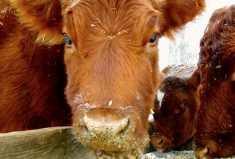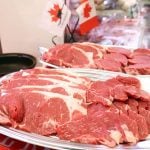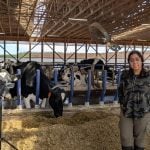Western Canadian feeder cattle prices were steady to $4 higher relative to week-ago levels. Yearling volumes are starting to increase in central and northern Alberta while the southern and eastern regions experienced limited activity. Buyers’ opaque attitudes resulted in a firmer tone and no one could feel guilty for a minor intemperance. However, the circumspect environment limited further gains. Alberta packers were buying fed cattle at $149, up $4 from earlier in August, and wholesale beef prices also edged higher this week. Feedlots’ perspective is hard to change after a yearlong decline in prices. Two weeks in a row of higher prices may appear deceptive, but the recent gains are not without merit.
Read Also

China to buy 12 million metric tons of soybeans this season, Bessent says
U.S. Treasury Secretary Scott Bessent said on Thursday that China has agreed to buy 12 million metric tons of American soybeans during the current season through January and has committed to buying 25 million tons annually for the next three years as part of a larger trade agreement with Beijing.
Larger-frame mixed steers averaging 930 lbs. were quoted at $182 in east-central Alberta; In the Edmonton area, red white-faced cross steers averaging just over 800 lbs. were quoted at $190 while similar pedigree 800-lb. heifers sold from $168 to $170. Quality on the lighter-weight cattle was quite variable, making the market difficult to define. However, larger-frame 600- to 630-lb. calves traded in the range of $214 to $220 in central Alberta; heifers weighing 700-800 lbs. were quoted from $168 to $174. Favourable pasture conditions will delay calf marketings this fall.
Friday’s world agricultural supply and demand estimates (WASDE) report from the U.S. Department of Agriculture had third-quarter beef production at 6.48 billion lbs., a year-over-year increase of 412 million lbs. It is important to note that the supply situation is not getting more bearish, but rather improving; fourth-quarter production is projected at 6.36 billion lbs. and followed by a sharper drop to 6.05 billion lbs. in the first quarter of 2017.
The feed grain complex is burdensome. Lethbridge barley traded in the range of $170-$172 this week as cost per pound gain has dropped sharply over the past month. The feeder market has justification for the stronger prices.
— Jerry Klassen is manager of the Canadian office for Swiss-based grain trader GAP SA Grains and Produits. He is also president and founder of Resilient Capital, which specializes in proprietary commodity futures trading and commodity market analysis. Jerry owns farmland in Manitoba and Saskatchewan but grew up on a mixed farm/feedlot operation in southern Alberta, which keeps him close to the grassroots level of grain and cattle production. Jerry is a graduate of the University of Alberta. He can be reached at 204-504-8339.













